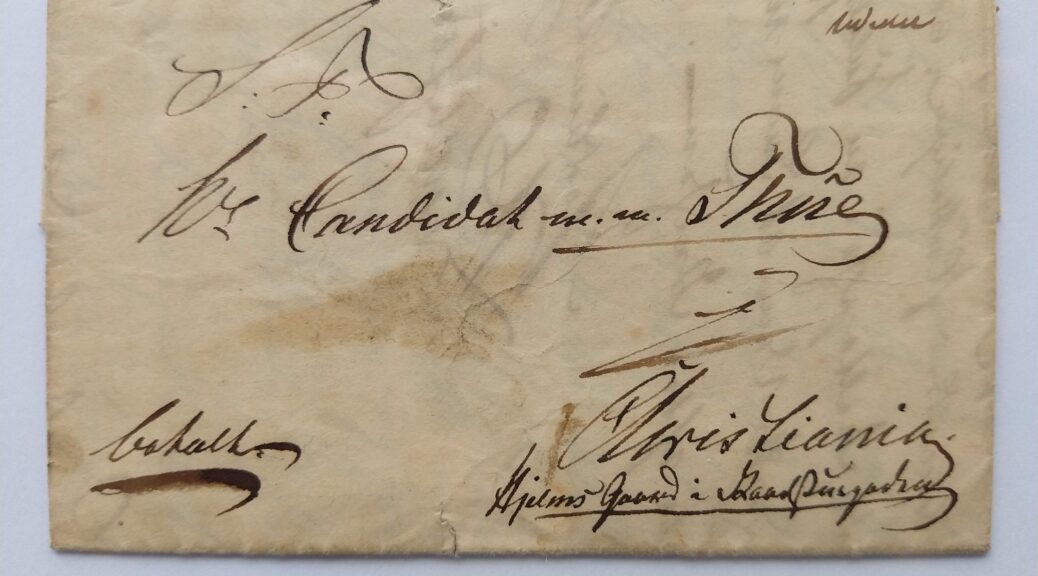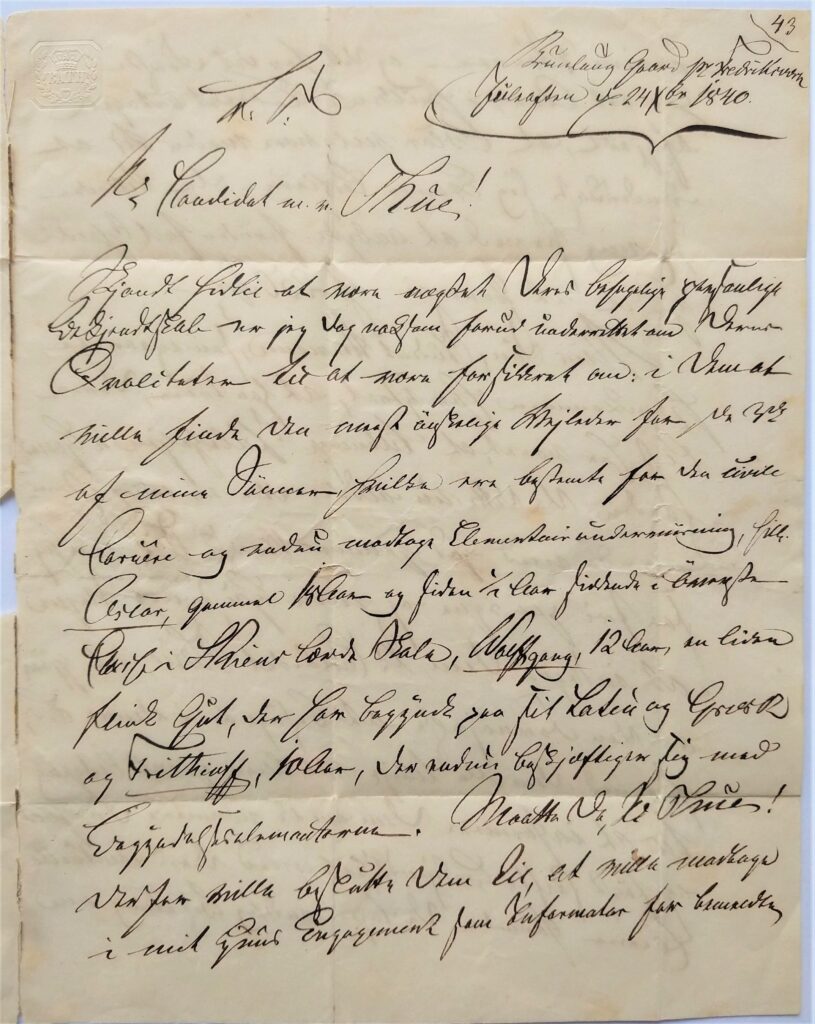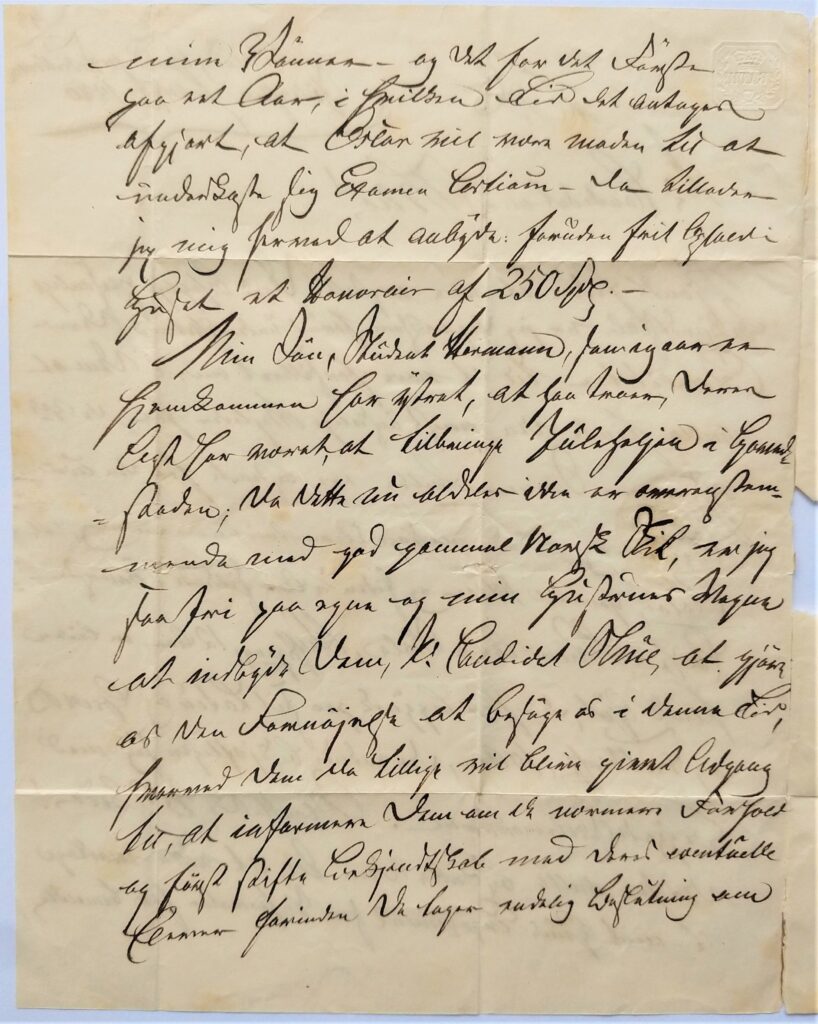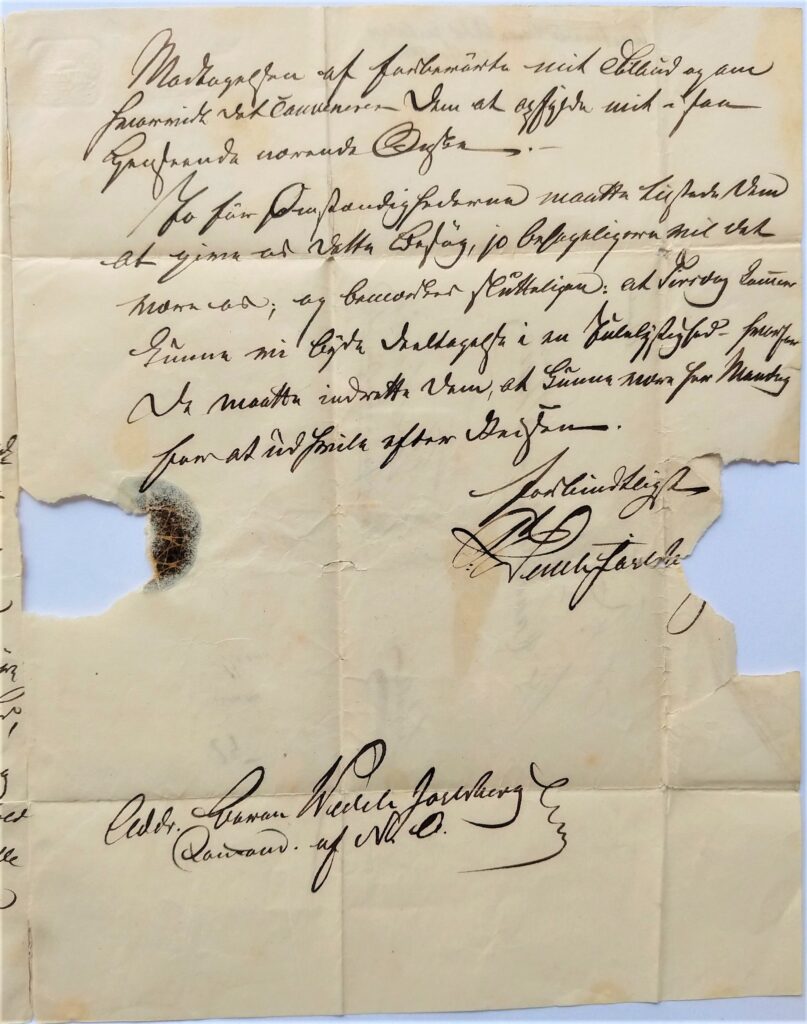
Point to Paper – All he wanted was a good teacher for his sons
Written by Kjartan Skogly Kversøy and translation of Norwegian Gothic handwriting by Gina Dahl
Baron Fredrik Wilhelm Wedel-Jarlsberg wrote a letter on Christmas Eve 1840. He was sitting in his office on his estate Brunlaug (or Brunla) just ouside the city of Stavern in Larvik municipality. He was looking for a tutor for his sons. His sons were named Oscar, Hermann and Wolfgang. He aimed high and tried to tempt Mr. Candidate Thue to take the job. Thue had just received the best grade in his civil service examination in philology. He was therefore sought after.
In today’s post, you will get to know the original letter, the candidate and the baron. Towards the end of the post, you will also get to know some contemporary history from the 1840s. It is history that effects us to this day. There is no direct connection between the first Anglo-Afghan war and the history surrounding the Baron, but I hope the link can contribute to a wider insight into the kind of time and world in which this letter was written. The Baron, like the Afghans, had fought the British and lost. During the Battle of Copenhagen in 1807, the entire Norwegian-Danish fleet fell into British hands. The British bombarded Copenhagen and in addition stole one merchant vessel, 15 frigates and 7 brigs. Wedel-Jarlsberg had become an officer just 16 years old. At the early age of 20, he was wounded during the fighting against the British. I am not entirely certain, but this might have been the reason the Baron got the Order of the Polar Star. In 1840 the Baron was no longer legally a baron. The last priviledges of the Norwegian aristocracy were lost by the law of 1821. He still signed his letters with his title.
The Baron probably wrote this letter with a quill pen or a dip pen with a metal tip. The uneven thickness of the writing points in the direction of a self-cut quill pen. Usually, quills were cut from goose feathers or turkey feathers. The ink was almost certainly iron gall ink. At this time, the paper was often made from cellulose, but since it was a baron who wrote the letter, it may have been rag paper. Rag paper was made from linen, jute, hemp or cotton. It was often used for documents that were meant to be durable over time. I think the letter looks mostly like it is paper made of cellulose.

The alphabet and the lettering used in the letter is a bit unfamiliar to most people today. It is difficult to read without the proper training. Before the 1870s most people in Norway used Blackletter. This is sometimes also called Gothic script. Fortunately, the letter has been translated by Gina Dahl. She is a Senior Academic Librarian at the University of Bergen. She works at the Library Department of special collections. You will be presented to her translation of the letter shortly.
The candidate the Baron was headhunting for was the up-and-coming philologist and literary historian Henning Junghans Thue . A few months later, in 1841, Thue became one of the very first university scholars at the newly established University of Christiania. Among other things, he is known for taking the role as a spontanious opponent from the audience (ex auditorium) during the disputation of the famous Søren Kierkegaard. This is a practice that is still permitted during most disputations (the oral examination of a PhD). Søren Kirkegaard’s defense was based on a thesis he had written on the concept of ‘irony’.

Henning Junghans Thue died young. He only reached the age of 35. He still managed to have an academic career and write several books. In 1844 he published Læsebog in Mothersmaalet for Norske og Danske (Reading book for the mother tongues of Norwegian and Danish). He was also head teacher at Arendal’s Secondary and Real School from 1844 and became a lecturer at Christiania Cathedral School in 1848. Thue died during a medical stay for his poor health in Württemberg in 1851.
Below follows the letter Mr. Candidate Thue received from the Baron. The letter is proof that the postal service was very swift in Norway at this time. It seems that the Baron expected that Thue would have the letter in his hand the very next day at the latest. In the letter, we can read clues that indicate that the Baron counted on efficient postage. He invites Thue to spend some of the Christmas days with his family. The letter was written on the Thursday the 24th of December. The Baron suggests that Thue can be at the estate as early as Monday the 28th. The baron wanted to give Thue an opportunity to have one day of rest after the journey before the planned party on December the 29th. This also suggests that the Baron expected that it would be possible for Thue to give an answer on the very same day he received the letter. If Mr. Candidate Thue received the letter on the 25th and returned an answer the same day, the Baron would receive the answer by Saturday the 26th or Sunday the 27th. This would not be possible in 2024, although we do have alternatives. Today this would be done with an email, a text message or just a call.
The baron writes about his three sons. They are aged 10 to 18. They have slightly different needs. The baron wants to prepare them for their future careers and would like to have a good teacher in place. The baron brags freely about Thue and offers him an annual salary of 250 Norwegian rigsdaler specie. If I have understood the statistics for salaries at the time correctly, this was almost 6 times the salary of a male servant in the cities and over 17 times the salary of a maid working at a countryside estate.
In the following you can read the letter that has been translated by Gina Dahl from Gothic script to ordinary modern Norwegian script. I have translated it further from Norwegian to English with the help of Google translate and with adjustments and corrections made by me. In cases were the words have not been possible to read inthe original text you wil see the following sign (??). The missing words do not seem to make any problems for understanding the text. I urge you to look at the original text. The Baraon seems to have confidence in his handwriting:

Brunlaug Estate Fredriksværn
Christmas Eve the 24th of December 1840.
To:
Mr Candidate Thue!
Although until now I have been denied your pleasant (??) true acquaintance, I am nevertheless sufficiently informed in advance of your qualities to be assured of: in you that I would find the only desirable guide for the three of my sons who are destined for a civil Career and need to receive Elementary teaching. Oscar, 18 years old and since ½ year in the top class in Skien’s learned school, Wolffgang, 12 years old, a very good boy, who has started his Latin and Greek and Frithioff, 10 years old, who is still dealing with the beginning elements. Will you, Mr Thue! Therefore, I would like to decide that I would accept in my house the Engagement as Educator for those registered

my sons – and in one year, in which time it is assumed that Oscar will be mature enough to submit to the Examen Artium (the exam that made you qualified for university studies)– then I hereby allow myself to offer: in addition to free accommodation in the house, an salary of 250 Norwegian rigsdaler specie (Norwegian money). My son, Student Hermann, who came home yesterday, has said that he thinks Your Excellency (??) has been spending Christmas in the capital; As this is now completely not in accordance with good old Norwegian custom, I am so free on behalf of myself and my wife to invite you, Mr. Candidate Thue, to do us the pleasure of visiting us at this time, whereby you will then also be given Access to inform you about the closer conditions and first establish acquaintance with your possible students before you make a final decision about

acceptance of the given offer and whether it is convenient for you to fulfill my wish in this regard.
The sooner circumstances force you to give us this visit, the more comfortable it will be for us, and finally note: that on Tuesday together we could offer participation at a Christmas party, why you had to arrange yourself, to be here on Monday to rest after the journey .
Contact Wedell Jarlsberg Addr; Baron Wedell Jarlsberg
Baron Fredrik Wilhelm Wedel-Jarlsberg did not manage to hire Mr. Candidate Thue. Unfortunately, I do not know who became his boys’ teacher. The odd little tale has been preserved thanks to a few drops of ink that were spread elegantly across two sheets of paper. It is an everyday story that would otherwise have disappeared into oblivion. History sometimes lives on because some people don’t throw away old letters. When certain letters get old enough they sometimes become too valuable to throw away. There can be both sentimental and financial reasons for preserving something.
Perhaps it is only a series of small coincidences that helped this letter survive for all this time. The letter was perhaps used as a bookmark and was rediscovered many years later when someone cleaned the attic. The last owner before me actually bought the letter at an auction in London. How the letter ended up in London is not easy to say. Now that the letter has arrived in Drammen, it almost feels like it is on its way back home. A few more miles, and the letter is back in place where it was written on the Christmas Eve of 1840.
If we take a look at what happened elsewhere in the world that year, there is much that still concerns us today. 1840 was the year the British claimed they conquered Afghanistan for the first time. It was the first Anglo-Afghan War. It had begun in 1839 on the basis that the British were paranoid that the Russians would conquer Afghanistan. They feared that the Russians would eventually split Asia in two. The intelligence was dubious and manipulated. The choices made were consistently poor. The Russians by no means had the resources needed.
It would not be the last time paranoia and disinformation started wars in the area. Some Afghans will claim that it all began in 1839. The Third Anglo-Afghan War ended in 1919. The result was the Treaty of Rawalpindi . Afghans celebrate their Liberation Day every year on August 19 to commemorate this agreement. The Russians finally came, but not until 1978. They stayed there until 1992. The British returned again nine years later in 2001. We only recently experienced through the TV screen how that ended.
The First Anglo-Afghan War ended in January 1842. An exhausted and ragged British military doctor knocked on the gate of the fort of his own countrymen in Jalalabad. He could tell that the entire force he had been a part of had been massacred in the Khyber Pass. At Christmas 1840, there was still optimism among the British forces stationed in Kabul. You didn’t need to be psychic to sense dark clouds on the horizon. The general who commanded the troops had gout. Untreated it is a very painful and eventually life threatening condition. There was no treatment in the 1840s. During an ongoing gout attack, even falling rain on bare skin can feel like being bombarded by thousands of glowing needles. At the time, the pain could last continuously for years. The general was badly affected. The pain stole all his attention. There was no room for thoughts about ensuring the safety of the soldiers. Only one man returned home.
References
Dalrymple, William (2013). Return of a King. The Battle for Afghanistan. London: Bloomsbury
Other references can be found in the text with blue lettering. These are direct links to the source of the information.
Photo
All photografs are taken by Kjartan Skogly Kversøy.